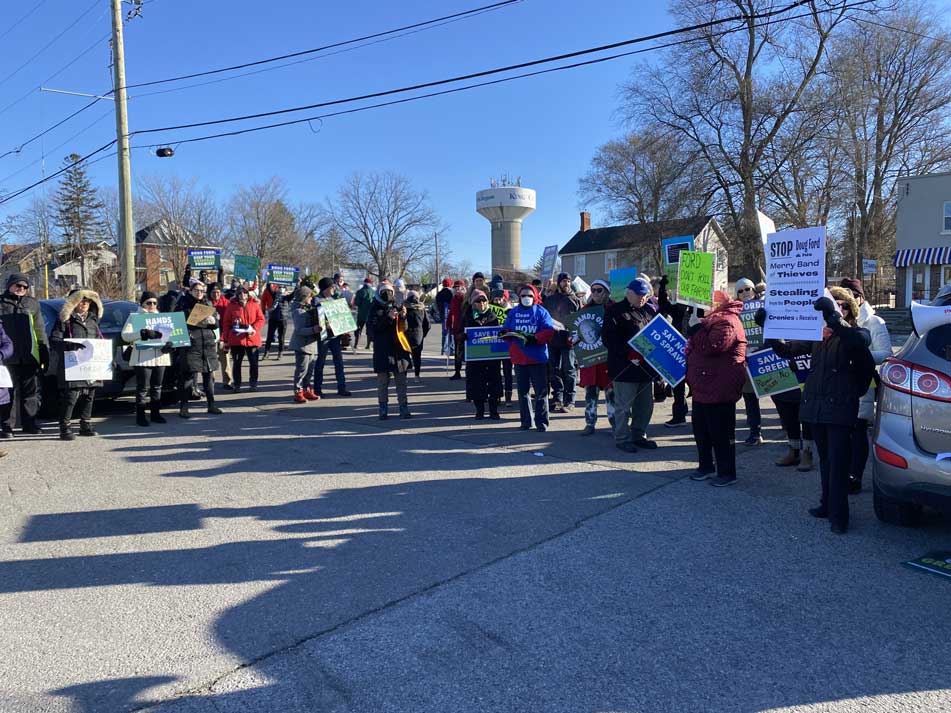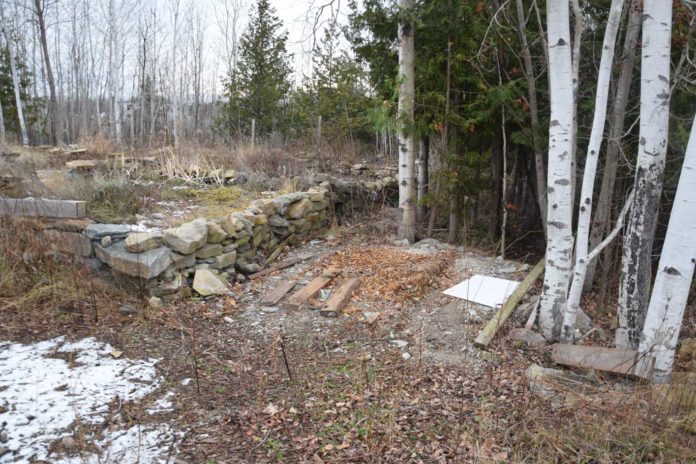TORONTO—Rallies erupted across the province this past weekend as Ontario residents continued to protest Bill 23, the More Homes Built Faster Act. More than 60 protests have occurred across the province since the bill was tabled on October 25. Bill 23, which the government says will fast track development in the midst of a housing crisis, received Royal Assent on November 28.
Critics say the omnibus bill contains sweeping changes that will remove or weaken environmental protections, lead to higher property taxes, undermines democracy, and won’t actually address the affordable housing crisis.
“More Homes Built Faster helps fulfill our government’s promise to help more Ontarians find a home that meets their needs and budget,” said Minister of Municipal Affairs and Housing Steve Clark.
The Act ‘removes unnecessary costs and cuts through red tape and other bottlenecks that stand in the way of new homes being built,’ the Minister said in a statement. The provincial government has set a goal of 1.5 million homes built over the next 10 years.
While the bill does remove duplicate plan approval requirements and adds measures to increase urban density and a mix of housing options, it also weakens or eliminates many housing development regulations that protect the natural environment and communities from poorly built developments.
A number of leading planners, designers and architects stated the legislation will not achieve its stated intent and will limit how communities are planned and built. The bill removes the requirement for public meetings for planning of subdivision and gives the Minister the power to amend municipal official plans without public consultation. It encourages urban sprawl and severely limits the role of Conservation Authorities, removing environmental protection and conservation from their oversight.
The bill freezes, reduces or exempts developer fees which are generally used to pay for new development services such as public parks, road and sewer infrastructure, and community centres.
The Association of Municipalities of Ontario (AMO) was not given the opportunity to present to the Legislature’s Standing Committee on Heritage and Culture during its review of Bill 23. The AMO says the changes could mean a shortfall of $5 billion to Ontario municipalities, leaving property taxpayers footing the bill through higher taxes or service cuts.
In a virtual submission to ‘interested members of the Legislature’ the AMO stated, “Provisions of the bill that advance and modernize Ontario’s land use planning framework are supported. Those that turn back the clock on planning, access to affordable housing, environmental protection, green building practices, and sustainable infrastructure financing are not supported and should be removed from the Bill or deferred pending focused consultation.”
“Current residents and businesses, the next generation of homeowners and renters and the hundreds of thousands of newcomers who make Ontario home will demand livable and safe communities with adequate amenities and a healthy and sustainable environment in which to thrive and prosper. That is not the future that Bill 23 will provide.”
Bill 23 needs to be repealed in its entirety, said Algoma-Manitoulin MPP Michael Mantha. He agreed that Ontario needs more affordable housing for families but Bill 23 removes 7,400 acres of land from the Greenbelt, which has been protected since 2005, including 4,500 acres of prime farmland.
The Greenbelt Act was created in 2005 to permanently protect agriculture and environmentally sensitive lands in the Greater Golden Horseshoe area (around Lake Ontario) from development.
Ontario recognized the critical role of Greenbelt lands in keeping drinking water clean and safe, mitigating damages caused by flooding, providing habitats for wildlife and for endangered species, and in preventing urban sprawl,” MPP Mantha said.
“Bill 23 is important to Northerners,” he told The Expositor. The reduction or loss of the Greenbelt will impact us in the North, he said. If the government can take land there without public consultation, they can take it in Northern Ontario. He also pointed to the removal of municipal planning powers and an increase in food insecurity.
“Ontario loses more than 300 acres of farmland every day to development,” said MPP Mantha.
In a letter to Ontario Auditor General Bonnie Lysyk, NDP MPP/leadership candidate Marit Stiles wrote, “The removal of Greenbelt lands also has several significant long-term environmental consequences, including threatening the integrity of interconnected natural and agricultural systems. Environmental experts warn that removing pieces of the Greenbelt threatens all of it.”
MPP Stiles asked the auditor general to “conduct a value-for-money audit” investigating how much wealth would be increased for landowners when the property is unprotected. The NDP also asked Ms. Lysyk to investigate the economic and environmental impacts on agricultural and natural systems and “to consider Sections 2 and 3 of the Members Integrity Act, which deal with MPP conflicts of interest and the sharing of insider information.”
The Ontario Green Party also condemned the legislation for its lack of consultation, with leader Mike Schreiner citing a lack of approval from anti-poverty activists, municipal representatives, healthcare workers and Indigenous people.
Ontario Regional Chief Glen Hare said the government’s passing of the bill without consulting First Nations violates the province’s duty to consult. “The Government of Ontario’s tabling of Bill 23 is a blatant violation of First Nations’ inherent, domestic and international rights over their ancestral and traditional territories,” he said. “Bill 23 will inevitably harm Ontario’s environmental heritage and weaken land and water protection.”
First Nations were not consulted prior to the tabling or passing of Bill 23 even though it makes significant changes to Ontario’s legislative and policy landscapes. The bill will have detrimental impacts on nine different development and environment-related acts under the guise of addressing Ontario’s housing crisis, Ontario Regional Chief Hare said.
“It is deeply concerning to the Chiefs of Ontario that the mandate of the Indigenous Affairs Ontario office, which is to ensure collaboration among ministries, engaging and consulting with First Nations on policy and legislative changes, continues to be unfulfilled.”
Premier Ford should have put this plan out as part of his election platform, said Mary Muter, chair of the Georgian Bay Great Lakes Foundation (GBGLF). “What he is doing is probably the most egregious thing I’ve ever know to happen in Ontario and Canada. It’s undemocratic.”
Sections of Bill 23 allow the destruction, alteration, redesignation or changes in the boundaries of wetlands, said Ms. Muter. “This will allow destruction of the most important element of aquatic ecosystems. Wetlands provide essential protected aquatic and terrestrial habitat and filter the water” and provide important flood absorption during extreme storm events.
“Bill 23 makes no sense in the face of climate change since wetlands provide critical climate resiliency,” Ms. Muter said. “I wish I could communicate with Premier Ford and tell him that the City of Houston is now spending $30 billion, tearing down new homes, excavating, removing and opening up ravines and re-establishing wetlands so that city can tolerate extreme storm events.”
Ontario has been lucky so far but it’s only a matter of time before we are hit with that kind of extreme weather event, she said.
The large houses that will be built on the now unprotected farmland will not alleviate the need for low income housing and will drive the need for more cars and highways, increasing Ontario’s greenhouse gas emissions. The transportation sector contributes the highest amount of greenhouse gas emissions in Ontario currently, followed by housing.
“It’s just absolute craziness, denying what needs to be done in terms of climate change, and denying what needs to be done to get more affordable housing built,” Ms. Muter said.





